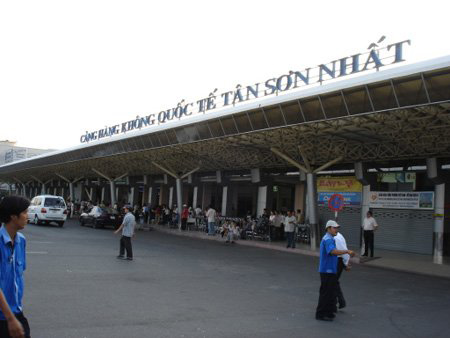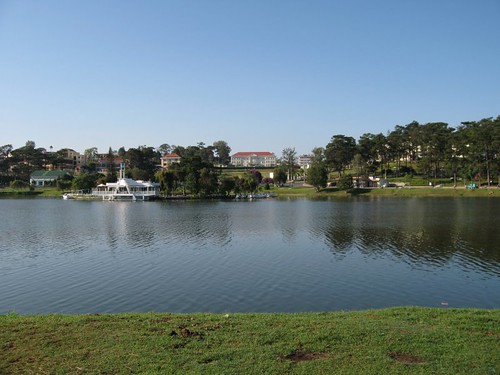A 15-minute drive and 20-minute boat ride from Dalat, you can climb into a makeshift seat atop an elephant and begin a bumpy and pleasant ride into the jungle, guided by a tiny, barefooted man who straddles the elephant’s head with ease.
Tea and English
Sometimes I remember the story beginning as we stepped out of the airport, greeted by a wave of oppressive humidity and hundreds of Vietnamese holding signs for someone named “Nguyen.” Getting into a Vietnamese taxi that wove its way through a sea of cars and bikes and motorbikes that would’ve terrified us had we not been too tired to care after the 17-hour flight. But in reality, we spent our first two hours in Vietnam trying to leave the airport. Trying to convince the customs officers that, although we did attend a Baptist university, we weren’t there to convert the defenseless masses. Our first encounter with a communist nation.
 The entrance to Tan Son Nhat airport, Ho Chi Minh, Vietnam
The entrance to Tan Son Nhat airport, Ho Chi Minh, Vietnam
Most visitors to Vietnam have come to experience what they imagine is a culture about as foreign to their own as any still in existence. But what most Vietnamese are anxious to show visitors is how well they can speak English. As we walked into an English class at a university in Ho Chi Minh City, the topic for the day was the impending threat of helmet laws for motorbike riders. Riders who maneuver traffic everyday that makes New York or even Rome look like the Disney’s Autotopia. Most Vietnamese couldn’t afford a helmet if they wanted to buy one, let alone pay the fines imposed if this law passed and they didn’t. Still, the conversation took a strange turn. “Helmets look funny,” one boy complained. “Yes,” another girl chimed in, “When you get to your date, your hair not look pretty.” Consensus was that the law shouldn’t pass.
After class, students migrate to the nearby “Tea & English.” If you appear foreign or let slip a word of English, expect to make new friends. For them, learning the language means they can get a job at a hotel or restaurant or shop — and maybe, one day, get to America.
The other side of the war
Visiting the Cu Chi Tunnels is often on the list of things to do for the first-time visitor to Vietnam. Before going down into the tunnels, government employees acting as tour guides lead you into a room where you sit in neat rows, staring at the ever- close- of Ho Chi Minh’s head floating on a backdrop of red until the video begins. The video gives the history of the Trail, explaining how it was built and the decisive role it played in the war.
Next, visitors stop to pose for photos on top of a rusty American tank; meanwhile, the tour guide explains how the Vietnamese stopped this tank in its tracks, killing the soldiers inside. Adding to the feeling of being in a war zone is the constant gunfire from the nearby shooting range — open to tourists for an additional fee — and the sound of mock land mines detonating if your foot trips one of the wires strung across the path. You then get a taste of travel down in the tunnels, which were clearly not sized for American frames. As you bend and squat and scrape your elbows on the jagged rock walls, you imagine Vietcong plots being hatched in the underground meeting room. Be sure to visit the souvenir/snack shop that finishes off the tour.
Chance encounter in a college town
Two lakes, a famous pagoda and one large waterfall draw many tourists to Dalat, six hours northeast of Ho Chi Minh City. There, in spite of its renown as the honeymoon Mecca of the nation, one feels a bit more as though they’re in their imagined Vietnam. Tiny women with brown, wrinkled skin waddle down the dirt roads balancing a stick with baskets of bread and vegetables on either side. Conical hats are everywhere and fewer people speak English, though enough to help the steady stream of tourists get by.
 Xuan Huong Lake, Dalat, Vietnam
Xuan Huong Lake, Dalat, Vietnam
A 15-minute drive and 20-minute boat ride from Dalat, you can climb into a makeshift seat atop an elephant and begin a bumpy and pleasant ride into the jungle, guided by a tiny, barefooted man who straddles the elephant’s head with ease. Plastic sheets are provided to protect you from the rain that comes without warning and exposes the surrounding jungle for its most vibrant of greens. After a 45-minute ride, with only a brief interruption to adjust the seat that’s begun to slide around to the belly of the beast, you’ll arrive at scattered bamboo homes lining a creek that swells by the minute with the falling rains. There, you may choose from one of several one-room “cabins” planted firmly on the ground, or you can bravely venture into the “tree house” towering 30 feet in the air.
Saying goodbye
Throughout the trip, the fact that you are in a Communist country is difficult to forget. And with that farewell, I said a regretful goodbye to the nation of Vietnam.



0 comments:
Post a Comment